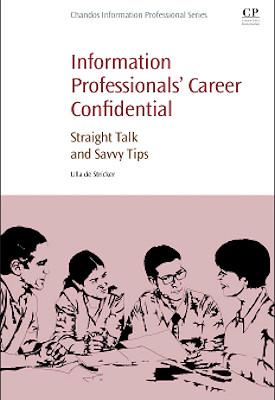
Book Review – Information Professionals’ Career Confidential: Straight Talk and Savvy Tips
October 11, 2015
By Robyn Schafer
Building a career takes time. It involves pursuing opportunities, embracing challenges and growing expertly. That is what Ulla de Stricker’s new book Information Professionals’ Career Confidential: Straight Talk and Savvy Tips is about. It is a motivating resource for new information professionals, or those interested in the profession, especially individuals open to alternative career options. The book covers a very wide variety of topics and practical skills, but moreover provides inspiration for what you can do to lead up to your dream career.
Over the course of her career Ulla has risen to the occasion, shifting the focus of her expertise to provide what the information profession needs. This publication is no exception. Among new professionals and LIS students there is anxiety, tension, and apprehension when considering their career options. This book helps ease the worry and gives practical suggestions on how to achieve your career goals. Ulla genuinely wants to help people succeed, pursue, and keep developing their careers.
Divided into two parts, forging and finding an information career, this book is a nice length and intended for people newly interested, studying, or entering the LIS field. It is a quick read that will open your mind to possibilities you had not considered before about the fast, evolving LIS world. As Ulla says, “my comments in this book are intended to inspire you to find your perfect professional path.” The book makes suggestions for alternative jobs that can set you on the path of accomplishing your career goals. The publication is presented in a variety of formats, kind of like a textbook. There are interviews, pop-out sections, and essential recommendations.
The tone is positive and the outlook optimistic. Ulla’s voice shines through, as the book is written like a conversation between a mentor and mentee. It includes interviews with a variety of professionals and students. This style may not be for everyone, but after reading tweets, posts and blogs about the new LIS professional struggle, it is nice to read about other options. Ulla calls this book a “sampling of considerations” and tells you what the challenges are without dwelling on them. Instead, Ulla’s book offers alternative opportunities and ways of succeeding.
Conversing or encouraging new LIS professionals to follow the path less taken can be tricky, as many wish to follow what Ulla calls the “pure path of librarianship.” Some individuals might take it as a threat of failure or a discouragement to follow your dreams. This book encourages the “alternative” and may not be for everyone. I myself have benefited from keeping an open mind. Ulla suggests that taking an opportunity that is right for the moment can greatly help you on your path to your ultimate career. You might even come across opportunities you didn’t know about and completely fulfill you. Ulla really makes you reflect on the big picture. What you do today, even if it isn’t the perfect, can lead to the big things you are after.
There were many surprise moments in the book that made me reflect on what makes me unique and how to contribute that to the workforce. I appreciate that a small amount of the content is on the current issues, and most put on solutions. Some of the examples or suggestion might have benefit from statistical information to back up them up. That being said, there were many topics that provide interesting insight not covered in LIS studies or workplace orientation. I particularly liked discussion on branding oneself. It would have been helpful if a few of the sections were explored in more detail, but that would compromise the easy read. Overall, this book resonated with me.
I found myself agreeing with many points, for example about volunteering time to make connections. At the same time I imagined colleagues who would probably disagree, arguing that free work devalues the profession. The field is not perfect. There are so many factors at play. However, that is also what makes it exciting and versatile. The book’s emphasis on connections and networking and participation are what stand out as advice all information professionals should heed. This book gives examples on how you can make those connections, posing important questions that in our busy lives we might be neglecting to ask. More than anything, this book will inspire. It will give you ideas and motivate you. It will encourage you to become an active player in paving your career path.
Robyn Schafer is recent graduate of the MLIS program at Western University. She is a reference librarian at Simon Fraser University and a GCDOCS Project Officer in the Government of Canada.
Add a new comment